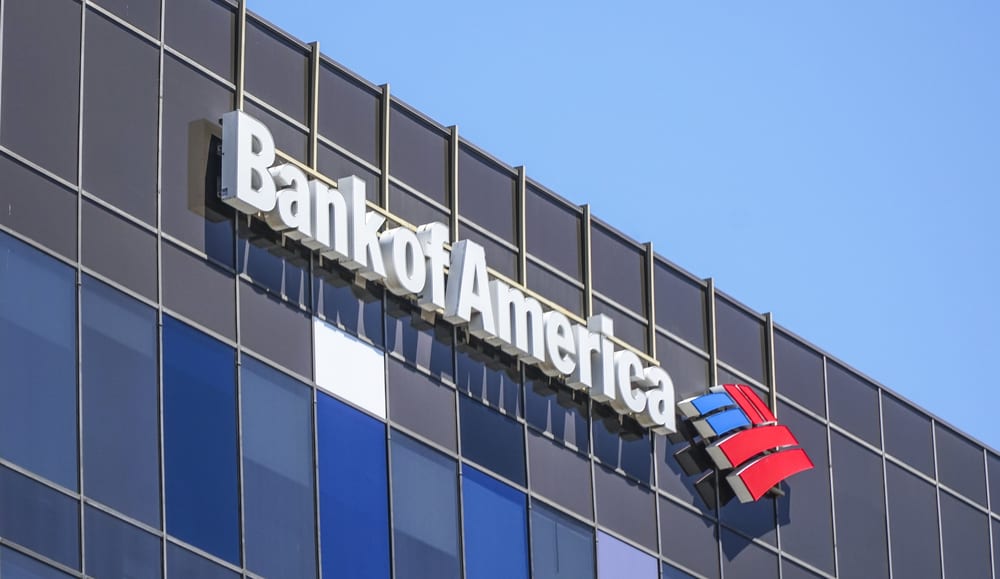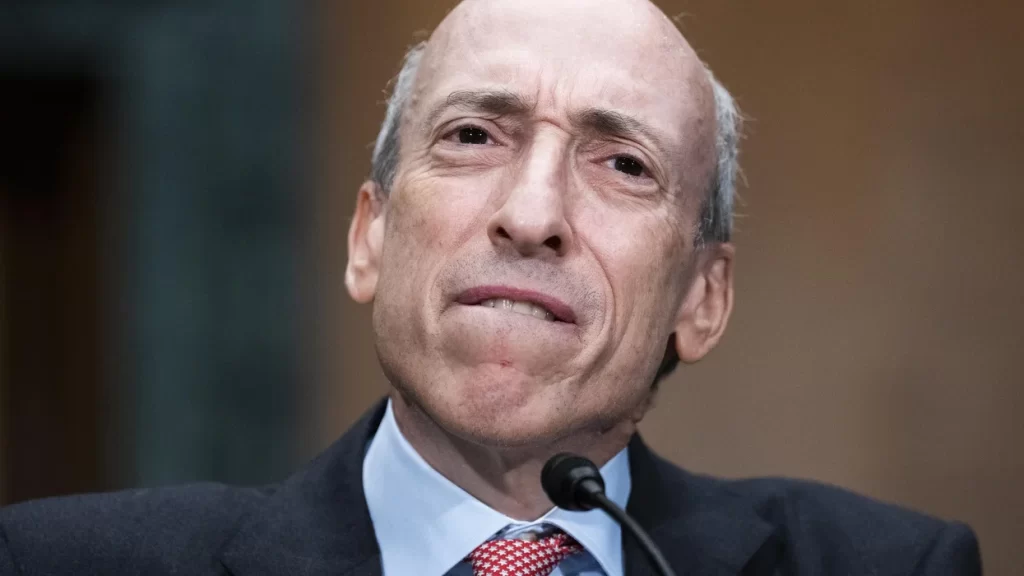Bank of America has released a research report highlighting the transformative potential of tokenization in the next five to 15 years.
Tokenization, which involves converting real-world assets into digital tokens on a blockchain network, could revolutionize financial and non-financial infrastructure, according to the report.
The report emphasizes the wide-ranging implications of tokenization across various sectors.
BofA’s Cryptocurrencies Research Team believes that the adoption of tokenization will redefine value transfer, settlement, and storage in all industries, leading to a transformative infrastructure revolution.
Tokenization has the potential to reshape asset management and trading over the next decade, offering increased efficiency, liquidity, and reduced transaction costs.
By representing assets as tokens on a blockchain, traditional complexities associated with intermediaries and paperwork can be minimized, enabling faster and more efficient transactions.
Bank of America suggests that the mainstream adoption of digital assets through blockchain technology will occur much faster than previous disruptive technologies like radio, television, and email.
The bank predicts rapid momentum among financial institutions and corporations in implementing blockchain technology due to the untapped efficiencies it offers.
The report clarifies that distributed ledger technology and tokenized traditional assets should not be confused with cryptocurrencies.
While blockchains record the ownership of the thousands of tokens in the digital asset ecosystem, BofA expects most of the current tokens to disappear within the next ten years.
The report explores various applications of tokenization in the digital realm, acknowledging that some tokens lack inherent value but can attract attention by representing a community’s value.
It provides examples such as memecoins like Shiba Inu (SHIB) and Pepecoin (PEPE) that gained significant attention despite their lack of utility.
However, the report recognizes that other tokens serve distinct purposes.
Furthermore, the report highlights the importance of certain digital assets, even if they lack intrinsic value, due to the emergence of public permissionless blockchains like Bitcoin and Ethereum.
These decentralized networks require tokens as incentives for participants involved in processing transactions within the network.
In conclusion, Bank of America’s research report emphasizes the transformative role of tokenization in finance and beyond.
Tokenization has the potential to revolutionize asset management, enhance efficiency, increase liquidity, and reduce transaction costs.
The report anticipates rapid adoption of digital assets and blockchain technology, driven by the efficiency gains they offer.
Other Stories:
Cboe Resubmits Bitcoin ETF Application With Fidelity, Collaborates with Coinbase
Shiba Inu Twitter Scam Exposed By ‘Shibarmy Scam Alerts’
U.S. Federal Reserve Certifies 57 Companies to Utilize ‘FedNow’ Instant Payments System
Privacy advocates achieved a significant victory in June as Binance announced its reversal on delisting privacy coins for users in several European countries.
This decision means that traders in Italy, Poland, Spain, and France can continue trading privacy coins such as Zcash, Secret, Firo, Navcoin, MobileCoin, Beam, and PIVX.
The potential ban on these coins would have been a grave mistake.
Privacy coins provide individuals with enhanced transactional security, countering financial surveillance, and safeguarding user confidentiality.
In an era plagued by excessive surveillance and a lack of privacy, the significance of these coins cannot be overstated.
Privacy coins possess fungibility, making each unit interchangeable and resistant to censorship, which sets them apart from most other cryptocurrencies.
Losing these additional layers of security and anonymity would have been a considerable loss for the crypto community.
The increasing adoption of privacy coins in recent years is a response to stringent regulations.
Binance’s decision aligns with the European Union’s efforts to establish standards for digital assets through the Markets in Crypto-Assets (MiCA) regulations.
As the European Securities and Markets Authority prepares to launch a MiCA consultation process in July, it is evident that Europe continues to shape the regulatory landscape for the crypto industry.
It is essential to recognize that privacy is a fundamental human right protected by the United Nations.
Article 12 of the Universal Declaration of Human Rights emphasizes the right to privacy and protection against interference.
This right should extend to the world of cryptocurrencies as well.
In the digital age, the need for privacy becomes even more critical as data exploitation risks escalate, and tech giants strive to control private information.
Binance’s decision reflects the delicate balance exchanges must maintain between regulatory compliance and users’ privacy needs, considering the varying international regulations they face.
Looking to the future, Binance’s decision, along with the regulatory pressure in Europe, may lead to increased demand and development within the privacy coins sector.
Paradoxically, this precedent could encourage other exchanges to reconsider their stance on privacy coins, potentially leading to wider availability.
This news highlights the power of community sentiment in shaping crypto policies and regulations.
Binance’s official statement acknowledged the influence of community feedback in their decision-making process.
It is crucial to understand and harness the community’s power to shape the future of the crypto industry.
The crypto community must unite and continue advocating for privacy, as it forms the foundation of Web3. As the Romans said, “ibi semper est victoria ubi est concordia”: There is always victory where there is unity.
Other Stories:
Shiba Inu (SHIB) Price Prediction For 2023 & 2025
U.S. Federal Reserve Certifies 57 Companies to Utilize ‘FedNow’ Instant Payments System
Cboe Resubmits Bitcoin ETF Application With Fidelity, Collaborates with Coinbase
Rumors about the resignation of Gary Gensler, the chair of the United States Securities and Exchange Commission (SEC), have once again been circulating.
Interestingly, artificial intelligence seems to have played a role in spreading these false claims.
On July 1, an article appeared on a website called “thecryptoalert.com,” stating that Gary Gensler had resigned following an internal investigation, citing an anonymous official as the source.
However, further investigation by Cointelegraph revealed that the text of the article was generated by an AI model, as indicated by the high score of 96.8% on the AI-detector ZeroGPT.
Upon examining the website, it became apparent that it was relatively new, with only 17 posts in total, the earliest of which was published on June 22nd.
Most of these articles also exhibited signs of being generated by artificial intelligence, with ZeroGPT scoring them around 70%.
Furthermore, a search on the internet archive Wayback Machine revealed that the ownership of the website’s domain, “thecryptoalert.com,” was updated on June 24 at 4:30 PM.
Despite these indicators, several Twitter accounts reposted the content, with one particular post by the account @whalechart gaining significant traction, garnering 1.4 million views.
However, on July 3, Fox Business Network reporter Charles Gasparino confirmed through a tweet that Gary Gensler is not resigning, after allegedly reaching out to the SEC for clarification.
This is not the first time rumors about Gensler’s resignation have circulated. On April 20, questionable sources spread claims that he was about to be “fired.”
Then, on June 12, U.S. lawmakers introduced a bill known as the “SEC Stabilization Act” to the House of Representatives, which included a provision seeking to remove Gensler from his position, accusing him of being a “tyrannical Chairman.”
In conclusion, false rumors of Gary Gensler’s resignation as SEC chair have been circulating once again.
These rumors were propagated through an article generated by an AI model on a relatively new website.
However, it has been confirmed that Gensler is not resigning, and these rumors are reminiscent of previous attempts to undermine his position.
Venture capitalist Tim Draper has revised his projected timeline for his bitcoin price prediction, acknowledging that his previous forecasts were off.
In a tweet on Friday, Draper revealed that when bitcoin was valued at $4,000, he had predicted it would climb 60 times and reach $250,000 by now.
However, the cryptocurrency ended June below $31,000, prompting Draper to admit that his prediction would take longer to materialize.
He stated that it may now take an additional two years for his $250,000 projection to come true.
Initially, Draper had predicted that bitcoin would reach $250,000 by the end of 2022. However, on December 31, 2022, he acknowledged that his forecast had missed the mark.
Nevertheless, he remained adamant that BTC would reach the predicted level before the halving event in 2024.
With his forecast failing to materialize in December 2022, Draper extended the timeframe for his BTC price prediction by six months, setting a new deadline of mid-2023.
In an interview with the Observer, he confidently declared that if this timeframe also proves unsuccessful, he is certain bitcoin will hit the $250,000 milestone before the end of 2024.
Draper expressed his confidence, stating, “I am almost 100 percent sure I will be right in 18 months.”
Additionally, he believes that increased adoption by women will contribute to the surge in bitcoin’s price beyond his estimate.
However, in his recent tweet, Draper revised his projection yet again. He now believes it may take until the end of June 2025 for bitcoin to reach the coveted $250,000 price point.
Draper has not only focused on price predictions but has also raised concerns about cryptocurrency regulation.
He criticized the U.S. Securities and Exchange Commission (SEC) and its chair, Gary Gensler, for their enforcement-focused approach to regulating the crypto industry.
Draper argued that “regulation by enforcement” is detrimental to the economy and highlighted that such practices are also negatively impacting China.
Despite the delays and challenges, Draper remains optimistic about bitcoin’s future trajectory.
While his previous predictions may not have come to pass, he maintains that BTC will eventually reach the $250,000 mark, albeit with an extended timeline.
Other Stories:
U.S. Federal Reserve Certifies 57 Companies to Utilize ‘FedNow’ Instant Payments System
Exchange operator Cboe has resubmitted an application with the U.S. Securities and Exchange Commission (SEC) to launch a bitcoin exchange-traded fund (ETF) in collaboration with asset manager Fidelity.
Cboe aims to address concerns raised by the SEC regarding the clarity and completeness of its initial filing. The SEC had previously raised similar concerns with Nasdaq over a spot bitcoin ETF filing by BlackRock.
One of the key issues was the failure to disclose the crypto-trading platforms that would enter into surveillance-sharing agreements to detect fraud in the bitcoin markets.
In addition to the Fidelity ETF, Cboe has also resubmitted listing applications for bitcoin ETFs by WisdomTree, VanEck, and a joint effort by Invesco and Galaxy.
Cboe intends to enter into a surveillance-sharing agreement with Coinbase for all these filings.
The SEC, Cboe, Nasdaq, Fidelity, and BlackRock declined to comment on the matter, while Coinbase was unavailable for comment.
It is worth noting that the SEC recently filed a lawsuit against Coinbase for failing to register as an exchange. According to Cboe’s Fidelity bitcoin ETF filing,
Coinbase represented roughly half of the U.S. dollar-bitcoin trading volume in May.
Coinbase has responded by filing a letter in federal court, seeking the dismissal of the SEC lawsuit, arguing that the regulator lacks authority to pursue civil claims since the crypto assets traded on its platform are not considered securities.
In addition to the Coinbase lawsuit, the SEC is also suing Binance, alleging that the world’s largest crypto-trading platform is involved in deceptive practices.
Concerns have been raised about the lack of transparency and auditability in the cryptocurrency market, with claims of rampant manipulation.
The recent filings for bitcoin ETFs by BlackRock and Fidelity have led to a surge in the price of bitcoin, reaching one-year highs and rising over 20% since June 15.
Despite the SEC’s request for more information on the ETF applications, the fact that the price of bitcoin has remained stable suggests that sentiment in the market is not turning bearish.
Analysts believe it was unrealistic to expect quick approval from the SEC, as the agency has previously rejected numerous spot bitcoin ETF applications due to concerns about fraudulent practices and investor protection.
Overall, Cboe’s renewed applications for bitcoin ETFs, along with similar filings by other firms, reflect the growing interest in providing regulated investment vehicles for cryptocurrencies.
However, the approval process still faces regulatory hurdles and the need to address concerns related to market manipulation and investor protection.
Other Stories:
Crypto ATM Company To Go Public After Announcing Merger
Crypto Investor Reports Huge Bitcoin (BTC) Gains With Questionable Strategy
South Korean crypto lending firm Delio is facing an investigation by the country’s Financial Services Commission (FSC) for alleged fraud, embezzlement, and breach of trust, according to a report by local news outlet Digital Asset.
The investigation stems from Delio’s unilateral decision to suspend users’ deposits and withdrawals on June 14.
Delio’s CEO, Jung Sang-ho, addressed concerned investors during an extraordinary meeting on June 17, stating that the company would resume withdrawals, albeit without a fixed schedule at that time.
Partial withdrawals for certain staking services were opened by the company on June 27. Sang-ho assured stakeholders that Delio would secure sufficient capital to compensate affected users.
As one of South Korea’s largest crypto lenders, Delio currently holds an estimated $1 billion worth of Bitcoin (BTC) and $8.1 billion in various altcoins.
The company’s CEO and management staff have been reportedly prohibited from leaving the country while the investigation is ongoing.
The suspension of withdrawals and deposits by Delio’s sister firm, Haru Invest, on June 13, citing issues with a “consignment operator,” likely triggered Delio’s decision to take similar action the following day due to counterparty exposure.
Following the announcement, Haru Invest has reportedly downsized its workforce significantly and is pursuing legal action against its service partner.
While Delio is a registered virtual asset provider (VASP) regulated by the country’s Financial Intelligence Unit, Haru Invest is allegedly not a VASP and thus falls outside the regulators’ jurisdiction.
It has been alleged that Delio management denied any exposure to Haru Invest shortly before the decision to suspend withdrawals.
The investigation by the FSC signifies a serious turn of events for Delio, a prominent player in the South Korean crypto lending industry.
The outcome of the investigation will determine the extent of the firm’s culpability and any potential consequences for its management.
The affected users and investors will be eagerly awaiting the resolution of this case to ascertain the fate of their assets and seek appropriate compensation.
Other Stories:
Crypto Investor Reports Huge Bitcoin (BTC) Gains With Questionable Strategy
A member of the r/CryptoCurrency community, known as r/Vaginosis-Psychosis on Reddit, recently shared their bold investment strategy, claiming to have profited $19,500 or 25% by taking out three personal loans totaling $59,000 to purchase Bitcoin over the past 18 months.
As of now, they hold 2.65 BTC, valued at $80,400, and are optimistic about BTC reaching $100,000 by early 2025.
In a post on June 30 on r/CryptoCurrency, the Redditor explained their approach to acquiring BTC through these risky loans.
The first two loans, acquired in February and June 2022, amounted to $15,000 and $20,000, respectively.
These loans carried fixed annual percentage rates (APR) of 6% and 4.9% with monthly payments of $225 and $326.
The third loan, obtained in June 2023, was worth $24,000 with a fixed APR of 8% and monthly payments of $405.
According to the Redditor, they have already paid off the $15,000 loan in May and made a $3,500 payment on the second loan.
Their plan is to focus on repaying the most recent loan due to its higher APR. Including interest paid, their average acquisition cost for BTC is around $24,000 or $22,264 without considering interest.
The Redditor justifies their investment strategy by highlighting their belief in the declining value of the US dollar.
They aim to repay the loans using the potentially inflated dollars they earn from their job.
Expressing confidence in Bitcoin’s future, they anticipate its price to reach approximately $100,000 per coin within 18 months.
With over 500 comments on the post, opinions are divided. While some express support for the idea, others caution against the risks associated with this approach.
One top comment with 457 upvotes argues that taking out loans for crypto investing is a horror story, citing survivorship bias and emphasizing the calculated nature of the Redditor’s risk.
The Redditor provides additional context, revealing that they are single with no dependents and earn an annual income of around $60,000.
They have affordable rental arrangements and are willing to invest 25–30% of their income into BTC each month.
The main risks they face include a significant crash in BTC price without recovery in the coming years and the potential loss of holdings due to hacking if they keep their assets in a hot wallet.
Sustaining employment is crucial for them to continue repaying the loans.
Despite the risks, some commenters encourage the Redditor, highlighting the potential life-changing outcome if their investment pays off.
They view the calculated risk as worth taking, even if the BTC price fails to exceed $35,000 for several years.
It is important to note that taking out loans to invest in cryptocurrency carries significant financial risks and should be approached with caution.
Other Stories:
ASX Considers Listing Tokenized Real-World Assets
UK To Pass Law To Bring Cryptocurrencies Under Traditional Asset Regulations
According to Yat Siu, the CEO of Animoca Brands, the crypto industry is experiencing contrasting conditions in different parts of the world.
While Web3 startups are thriving in the Middle East and Asia, crypto entrepreneurs in North America are facing challenges due to tough macroeconomic and regulatory circumstances.
Siu shared his insights with Cointelegraph during the Collision conference in Toronto, emphasizing that the situation is not as dire as it may seem.
Siu acknowledged that Web3 startups can still secure funding from venture firms, but he pointed out that current conditions, such as higher interest rates and a decline in crypto asset prices, have raised the entry barrier for newcomers.
Despite these challenges, Siu remains optimistic, stating that the number of builders and smart contracts in the space continues to increase.
He also highlighted that Animoca Brands had made nearly 60 investments in the past few months, underscoring their bullish stance.
However, the overall strength of the crypto industry has diminished compared to its past performance.
According to the PitchBook Crypto Report for Q1 2023, crypto companies raised $2.6 billion across 353 investment rounds, representing a decrease of 11% and 12.2% in deal values and total deal value, respectively.
Siu’s comments follow significant developments in the crypto space, including the collapse of FTX in November 2022.
In the United States, the Securities and Exchange Commission has launched a crackdown on crypto firms, aiming to regulate the industry through enforcement actions.
In contrast, Hong Kong and the United Kingdom have implemented licensing systems and approved legislation to regulate crypto businesses and mitigate associated risks.
Siu noted that the regulatory aspect has had a significant impact on Web3 companies, generating fear and uncertainty among market participants.
He highlighted the contrasting environments between North America and regions like the Middle East and Asia, where the crypto industry remains vibrant.
Siu believes that these different approaches reflect each country’s agenda for emerging technology.
According to Siu, the diverse regulatory landscapes are not coincidental but rather deliberate decisions based on national interests.
He believes that by relinquishing control of the crypto industry to other parts of the world, the United States is enabling the flourishing of ecosystems that were previously constrained.
While Siu acknowledges the importance of the U.S. in the crypto space, he believes that political reasons have compelled the country to cede its role to other global players.
Overall, Siu’s observations shed light on the varying conditions faced by crypto entrepreneurs worldwide, highlighting the challenges in North America and the opportunities in the Middle East and Asia.
Despite regulatory hurdles, Siu remains optimistic about the continued growth of the crypto industry and the emergence of thriving ecosystems around the world.
Other Stories:
ASX Considers Listing Tokenized Real-World Assets
UK To Pass Law To Bring Cryptocurrencies Under Traditional Asset Regulations
Maple Finance Launches Direct Lending Program, Filling Void Left by Bankrupt Lenders
The launch of a spot Bitcoin exchange-traded fund (ETF) in the United States may face a longer delay as recent applications from investment managers have been deemed inadequate by the Securities and Exchange Commission (SEC).
The SEC has notified the Nasdaq and the Chicago Board Options Exchange (Cboe), representing asset managers, that their filings lack clarity and comprehensiveness.
The main concern raised by the SEC is the absence of a “surveillance-sharing agreement” with a spot Bitcoin exchange or insufficient details about surveillance arrangements.
However, the asset managers have the option to resubmit their applications after providing the necessary clarifications.
Following BlackRock’s inclusion among the companies aiming to launch the first spot Bitcoin ETF on Wall Street, a series of applications have been filed in recent weeks.
BlackRock’s application introduced a surveillance sharing agreement, which involves sharing information about market trading and clearing activities between entities to prevent potential market manipulation.
This move prompted ARK Invest and 21Shares to amend their own applications, including a similar surveillance agreement.
Other asset managers such as Invesco, WisdomTree, Valkyrie, and Fidelity have also resubmitted or amended their applications, with ARK Invest reportedly leading the race.
Exchange-traded funds (ETFs) are investment vehicles that track specific indices and are typically traded on exchanges.
In the cryptocurrency market, a cryptocurrency ETF refers to a fund that tracks the price of one or multiple digital tokens and comprises various cryptocurrencies.
The SEC has consistently denied spot Bitcoin ETFs since 2017. However, Canada has already made this financial product available.
Three notable funds—Purpose Bitcoin, 3iQ CoinShares, and CI Galaxy Bitcoin—have directly invested in spot Bitcoin in Canada.
In summary, the launch of a spot Bitcoin ETF in the United States is likely to experience a delay as the SEC has deemed recent applications inadequate due to a lack of clarity and comprehensive information.
Asset managers have the opportunity to rectify the filings and resubmit them after addressing the SEC’s concerns.
While spot Bitcoin ETFs have been denied by the SEC since 2017, Canada has already approved and offers several funds that directly invest in spot Bitcoin.
Other Stories:
ASX Considers Listing Tokenized Real-World Assets
CME Group to Introduce Ether/Bitcoin Ratio Futures
UK To Pass Law To Bring Cryptocurrencies Under Traditional Asset Regulations
Bitcoin (BTC) experienced a sharp decline below the $30,000 mark after the opening of Wall Street on June 30, causing concern among investors regarding the future of the first spot exchange-traded funds (ETFs) for the cryptocurrency.
The drop in BTC’s price was accompanied by reports that the U.S. Securities and Exchange Commission (SEC) had rejected applications for the first Bitcoin spot-price ETF.
These applications had initially fueled a recent price surge that propelled Bitcoin to new yearly highs.
According to sources cited by The Wall Street Journal, the applications had been returned, leading BTC/USD to hit a nine-day low before recovering to hover around $30,000.
The report highlighted that the applications were rejected due to a technicality – the failure to name the spot bitcoin exchange and provide sufficient information about surveillance-sharing agreements.
Despite the setback, some market observers viewed this as a minor issue that could be addressed by updating the language and resubmitting the applications.
In fact, financial commentator Tedtalksmacro saw the SEC’s actions as a positive sign, suggesting that it provided guidance to asset managers like BlackRock on how to get the applications approved.
Meanwhile, Bitcoin’s price continued to trade lower, losing over $1,000 from its daily highs at the time of writing.
This decline occurred just before the monthly and quarterly candle close, adding to the significance of the situation.
Adding to the confusion in the markets, the U.S. macroeconomic data released showed the Personal Consumption Expenditures (PCE) Index falling lower than expected, marking its biggest drop in a year.
Despite signs of slowing inflation, the markets began pricing in a higher possibility of interest rate hikes in July.
The increasing expectations of a rate hike were reflected in the latest data from CME Group’s FedWatch Tool, which indicated a nearly 90% chance of a 25-basis-point increase.
The Kobeissi Letter, a financial commentary resource, argued that despite the data, inflation remained too high, highlighting that the core PCE inflation rate had remained unchanged since December 2022 at 4.6%, posing a significant challenge for the Fed.
In summary, Bitcoin experienced a price drop below $30,000 due to reports of the SEC rejecting applications for Bitcoin spot-price ETFs.
However, market observers remained optimistic, considering the rejection to be a technicality that could be addressed.
Additionally, the markets faced confusion with lower-than-expected PCE data and rising expectations of interest rate hikes, despite concerns about high inflation levels.
Other Stories:
UK To Pass Law To Bring Cryptocurrencies Under Traditional Asset Regulations
Maple Finance Launches Direct Lending Program, Filling Void Left by Bankrupt Lenders










